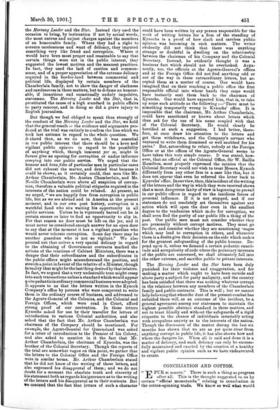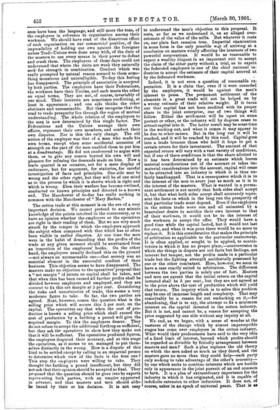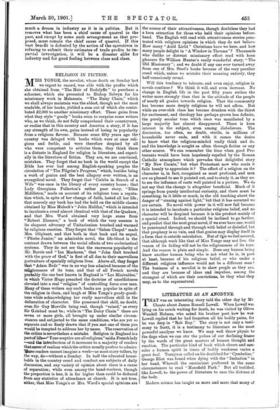CONCILIATION AND COTTON.
"E FUR si inuove." There is such a thing as progress after all. This is the thought suggested to us by certain "official memoranda" relating to conciliation in the cotton-spinning trade. We know so well what would once have been the language, and still more the tone, of the employers in reference to organisation among their workmen. We should have read of the disastrous effect of such organisation on our commercial position, of the impossibility of holding our own against the foreigner unless Trade-Unions were done away with, of the duty of the masters to use every means in their power to defeat and crush them. The employers of those days could not understand that where the units are weak they naturally seek- for strength in combination. Conduct which was really prompted by natural reason seemed to them some- thing monstrous and unintelligible. To-day this feeling has disappeared. The principle of association is accepted by both parties. The employers have their Federations, the workmen have their Unions, and each meets the other on equal terms. They are not, of course, invariably of one mind. Their interests are sometimes conflicting, at least in appearance ; and one side thinks the other obstinate and unreasonable. But they recognise that the road to trade prosperity lies through the region of mutual understanding. The ,whole relation of the employers to the men is now determined by this single factor. The Federations and the Unions manage their own affairs, represent their own members, and conduct their own disputes. Nor is this the only change. The old notion of the employer was that of a man who made his own terms, except when some accidental accession of strength on the part of the men enabled them to put him at a disadvantage. He did not condescend toargue with them, or to give any reason beyond his own will and pleasure for refusing the demands made on him. Now a trade quarrel is an occasion, not for a mere display of endurance, but for argument, for statistics, for careful investigation of facts and principles. One side may be wrong and the other right, but they will be of one mind as to the process by which it is shown which is right and which is wrong. Even their warfare has become civilised, conducted on known principles and directed to a known end. The Manchester of to-day has really nothing in common with the Manchester of "Mary Barton."
The cotton trade at this moment is on the eve of a very important decision. We cannot pretend to any minute knowledge of the points involved in the controversy, or to have an opinion whether the employers or the operatives are right in their reading of them. But we are very much struck by the temper in which the employers approach the subject when compared with that which has so often been visible in earlier disputes. At one time the men were in the habit of demanding that the profits of the trade at any given moment should be ascertained from an inspection of the employers' books. On the other band, the employers usually declined this on the ground —not always an unreasonable one—that secrecy was an essential element in the successful conduct of their business. This objection seems to have disappeared. The masters make no objection to the operatives' proposal that a "net margin" of return on capital shall be taken, and that when this has been earned all further profits shall be divided between employers and employed, and they are content to fix this net margin at 5 per cent. Considering the risks and uncertainties of trade, this seems a very moderate figure to take. So far, the two parties are agreed. Next, however, comes the question what is the selling price which will secure this 5 per cent, on the capital. The operatives say that when the coat of pro- duction is known a selling price which shall exceed the cost of production by a farthing a pound will give the required margin. To this the employers demur. They do not refuse to accept the additional farthing as sufficient, but they ask tht. operatives to show how they make out that it will be sufficient. The operatives produced figures, the employers disputed their accuracy, and at this stage the operatives, as it seems to us, managed to put them- selves distinctly in the wrong. How is a dispute of this' 'kind to be settled except by calling in an impartial person to determine which view of the facts is the true one ? This step the employers were willing to take. They thought the farthing a pound insufficient, but they did not ask that their opinion should be accepted as final. They proposed that the question should be gone into by experts representing both parties, with an umpire appointed in advance, and that masters and men should alike be bound by their or his decision. It is not easy to understand the men's objection to this proposal It rests, so far as we understand it, on an alleged Over- estimate of the value of the mills. But whatever it rests on, one plain fact remains true. Impartial examination in some form is the only possible way of arriving at a conclusion on matters vitally affecting the interests of two powerful corporations. It would be as reasonable to expect a wealthy litigant in an important suit to accept the claim of the other party without a, trial, as to expect the federated employers in one of the chief national in- dustries to accept the estimate of their capital arrived at by the federated workmen.
Indeed, it is not even a question of reasonable ex- pectation. It is a claim that, even if it were conceded by the employers, it would be against the men's interest to press. The permanent settlement .of the elements in a great trade will not be helped on by a wrong estimate of their relative weight. If it turns out that capital has not been credited with its proper share in the joint enterprise, one of two things will follow. Either the settlement will be upset on some pretext or other, or the industry will by degrees cease to attract capital into it. The latter result may be some time in the working out, and when it comes it may appear to be due to other causes. But in the long run it will be reached, and it will be reached by this road. Capital goes into a trade because those who hold it hope to get a certain return for their investment. The amount of that expected return will vary with a vast variety of conditions, but if one of these conditions is that the share allotted to it has been determined by an estimate which leaves material considerations out of the account or takes im- material considerations into the account, capital will cease to be attracted into an industry in which it is thus un- fairly handicapped. That is a consequence which it is to the interest of the men to avert just as much as it is to the interest of the masters. What is wanted in a perma- nent settlement is not merely that both sides shall accept it, but that what both sides accept shall accurately repre- sent the facts on which in the long run the prosperity of that particular trade must depend. Even if the employers in the cotton trade were one and all animated by a benevolent desire to sacrifice their own interest to that of their workmen, it would not be to the interest of the workmen to accept the offer. They would have a good time while the capital lasted, but it would not last for ever, and when it was gone there would be no more to replace it. It is this consideration that makes the principle of arbitration so applicable to the particular controversy. It is often applied, or sought to be applied, to contro- versies in which it has no proper place,—controversies in which the things in dispute are not facts hut feelings, not interest but temper, not the profits made in a particular trade but the fighting strength accidentally possessed by one or the other combatant. Here, however, we seem to have a case exactly suited to arbitration. The difference. between the two parties is solely one of fact. Masters and men are agreed that the initial return on the capital invested shall be 5 per cent., but they are not agreed as to the price above the cost of production which will yield that return. The inquiry which is to solve this problem may be one of immense length and complexity. That may conceivably be a reason for not embarking on it,—for abandoning, that is to say, the attempt to fix a minimum interest on the capital invested in the cotton industry. But it is not, and cannot be, a reason for accepting the price suggested by one side without any inquiry at all.
We ,end, as we began, with a sense of wonder at the vastness of the change which by almost imperceptible stages has come over employers in the cotton industry. What would their predecessors have said to the very idea, of a fixed limit of interest, beyond which profits should be regarded as divisible by friendly arrangement between masters and men ? Such a plan replaces the old theory on which the men asked as much as they dared, and the masters gave no more than they could help—each party only seeking to take advantage of the other's necessity— by one which seeks to combine interests which are hostile only in appearance in the joint pursuit of an end common to both. It is a plan of extraordinary importance for the industry in which it has originated, and it is capable of indefinite extension to other industries. It does not, of course, usher in an epoch of universal peace. That is as
much a dream in industry as it is in politics. But it removes what has been a chief cause of quarrel in the past, and except by some such arrangement as that pro- posed. must remain the chief cause of quarrel. If this vast benefit is defeated by the action of the operatives in refusing to submit their estimates of trade profits to im- partial investigation, it will be a disaster alike for industry and for good feeling.between class and class.








































 Previous page
Previous page